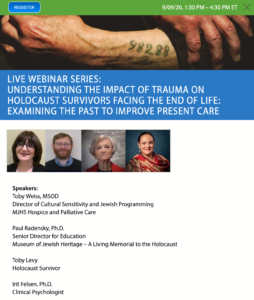My friend’s 90 plus year old mother was receiving hospice care in one of the only facilities in Jerusalem offering inpatient care of this kind. I went there with her, and met with the psychiatrist who was in charge of the facility. We talked a little, and in the course of our short conversation I mentioned that my friend’s mother was a Holocaust survivor, and that while she was not fully coherent anymore, it would be good to let staff know that she (like many others in long-term care facilities in Jerusalem) is a Holocaust survivor, and that when she appears agitated, she might be experiencing traumatic memories that often return and are re-lived by survivors. The psychiatrist summarily dismissed my comment saying, “this has nothing to do with the Holocaust! We call it sundowning!”
Indeed, older individuals who suffer from some cognitive impairment often manifest confusion, agitation and anxiety at sundown and after dark, a well-known phenomenon. Yet the anxieties and fears evoked for each individual might be very different according to the things we each have encountered during our lives. Trauma, abuse, loss, and mistreatment leave strong emotional echoes. Fears remembered in the body come alive during sundowning, and can be also evoked by other triggers, such as loud or sharp voices, abrupt movements, being physically handled impatiently, and more. Anesthesia often has similar effects on otherwise highly functioning survivors, causing confusion and the return of traumatic experiences, which appear hallucinatory, and are indeed, but are also very real and based in past traumatic horrors endured decades ago.
It is critical to educate medical staff, and all those working with elderly survivors of the Holocaust and other trauma survivors, about the reverberations of prior trauma in the lives of their patients. Offering compassion and empathy to survivors during their last days among us is critical for them, and for us in upholding our humanity.
On Wednesday, September 9 at 1:30 – 4:30 EDT, I will be offering an online live presentation as part of the webinar series organized by MJHS and the Museum of Jewish Heritage: A Living Memorial to the Holocaust. The webinar is intended for professionals working with Holocaust survivors and other trauma survivors. All Disciplines Welcomed! (3.0 CEU’s).
For more information and registration, please click on the image above.
Irit Felsen


Leave a Reply